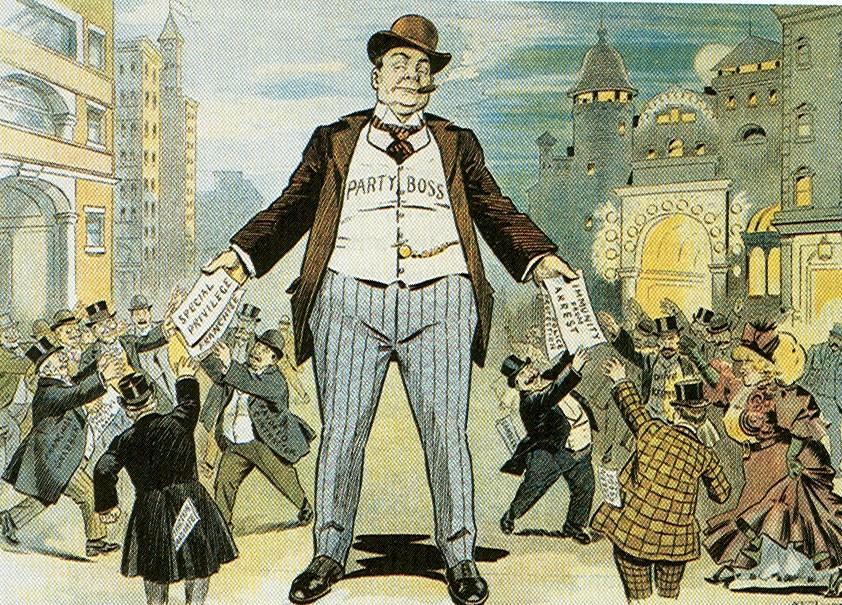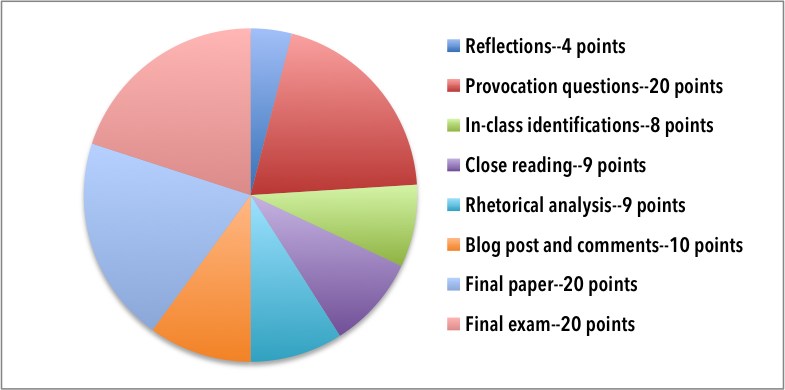ENGL 293C. American Gilded Ages:
Reading the Limits of the Twentieth Century

It’s become something of a commonplace that the beginning of the twenty-first century looks very much like a second Gilded Age. Thomas Piketty calls our current moment a second Belle Epoque in Capital in the Twenty-First Century, Fred Armisen and Carrie Brownstein joke on Portlandia that “The dream of the 1890s is alive in Portland,” and the Comedy Central series Another Period mines the first Gilded Age for laughs by depicting the Vanderbilt-like Bellacourt family in the reality-TV mode of Keeping Up with the Kardashians or the Real Housewives of Orange County. This course examines the connections between the literature, history, and popular culture of the early twentieth century and that of today. We consider muckraking texts, environmental writing, and naturalist depictions of race in America to compare the cultural forms, historical contexts and political and social issues that resonate both today and at the turn of the previous century.
Course Information
Winter 2017
MWF 1:25-2:20
Wilson 2017
Instructor Information
Sydney Bufkin
Washington 108
bufkins@wlu.edu
Office hours:
M and W 9:00-10:00
Tu 1:00-3:00
And by appointment
Course Objectives
This semester you will:
- Analyze literature and culture in historical context, and across historical contexts
- Read closely, recognizing subtle and complex differences in language use
- Make connections between texts from different time periods and media
- Make thoughtful analytic connections between literary production and popular culture
- Practice developing analytic claims and supporting those claims with specific, appropriate and properly cited evidence
- Write clear, persuasive analytical essays driven by arguments about texts
- Reflect on and hone your writing process, with particular attention to revision
- Derive pleasure and edification from a broad range of texts
Required Texts
- Bacigalupi, Paolo. The Water Knife. New York: Knopf, 2015.
- Dunbar, Paul Laurence. The Sport of the Gods and Other Writing. Ed. Shelley Fisher Fishkin and David Bradley. New York: Modern Library, 2005
- DuVernay, Ava. 13th. Netflix, 2016.
- Ehrenreich, Barbara. Nickel and Dimed: On (Not) Getting By in America. 2001. 10th Anniversary Edition. New York: Picador, 2011.
- Simon, David. The Wire. Season 1. HBO, 2002.
- Sinclair, Upton. The Jungle. 1906. Centennial Edition. Ed. Eric Schlosser. New York: Penguin, 2006.
- Stradling, David, ed. Conservation in the Progressive Era: Classic Texts. Seattle: U of Washington Press, 2004.
- Course reader, available at the W&L bookstore
Grading

Grading scale
93-100 points A
90-92 points A-
87-98 points B+
83-86 points B
80-82 points B-
77-79 points C+
73-76 points C
70-72 points C-
67-69 points D+
63-66 points D
60-62 points D-
Assignments
Provocation questions
At the beginning of the course, you will be assigned to either a Monday, Wednesday or Friday provocation question group. Each week on your assigned day, you will be responsible for submitting a detailed, substantive question about some aspect of that day’s reading. At the beginning of the term, we will discuss what constitutes a detailed, substantive question, and I will provide several examples for you to refer to. Provocation questions must be posted to the course blog no later than midnight on the day before class. Over the course of the term, you will submit eleven provocation questions; I will average the top ten.
Exams and in-class identifications
Throughout the term I will administer short, unannounced in-class identification assignments. These exercises will ask you to make connections between two readings for the day, or to write about the context and significance of a line or section from that day’s reading; you may also be asked to provide a brief analysis. We will have at least 8 responses over the course of the term. If there are more than 8, I will count only your top 8 grades.
These identifications will prepare you for your final exam, which will contain identification questions that are very similar to those that we practice in class.
Reflections
At several points throughout the term, I will ask you to reflect on and write about the material in the course. These reflections are intended to help you think about the readings in relation to one another and to the themes of the course as a whole, as well as to give you an opportunity to construct a study plan for the exams. They are not intended to test your knowledge of the reading, and I will not be evaluating them for content or correctness. They will be graded on a check plus/check/check minus basis.
Writing Assignments
Blog posts and comments (500-750 words)
Any engagement with contemporary literature and culture must contend with the centrality of the Internet in disseminating cultural criticism and popularizing literary and cultural artifacts. The most exciting and timely discussion of the connections between our historical past and present take place on Twitter, blogs and even YouTube. One of our goals in this course will be to become active participants in this conversation through regular and substantive blogging. You will be responsible for writing a thoughtful and well-researched blog post that makes connections between the texts we discuss in class and current conversations among cultural critics and public intellectuals.
You will also be responsible for reading and commenting on your classmates’ blog posts. At the beginning of the term we will collectively determine a commenting schedule so that each member of the class reads and responds to a variety of classmates’ blogs, creating a sustained discussion through the term.
Close reading (500-750 words)
Literary analysis is grounded in close reading. This term, you will write a short, focused close reading of an important passage in a text. The goal of this assignment is to look in depth at a small part of the text, rather than reflecting generally on the entirety. You should be able to identify a few paragraphs—a page at most—from which you will draw your evidence and focus your analysis. Your goal should be to connect the insights you draw from a short and well-defined section of the text to the work as a whole—that is, you will draw most of your evidence from a single passage, but your thesis and conclusion will attempt to show why your ideas about this one section are relevant to understanding the work as a whole.
Rhetorical analysis (500-750 words)
This term, we will read a number of texts written to persuade readers about political and economic issues. To engage with these arguments, you will write a short, focused rhetorical analysis of an essay, speech, or excerpt from a longer work. You will analyze the argument’s premises, evidence, conclusions and appeals to emotions and values, and will connect that analysis to the audience or audiences for the argument.
Final paper (1000-2000 words)
You may choose from several options for your final paper. They include:
A) An analytic paper that examines two or more texts from the syllabus, enlarging or expanding on one or more ideas from your blog posts and provocation questions. Your paper will combine close readings, summary, and synthesis in order to show your reader something interesting that emerges when you consider two or three texts in relation to each other.
B) A critical essay written for a blog or website that focuses on cultural criticism. This essay may present an argument about one of the texts from the course in terms that will be appealing to a broader audience, or it may connect one or more of the course readings to contemporary issues. You will also write a short reflective essay on why you chose the specific publication venue for your essay, what expectations and interests your audience is likely to have, and how you addressed those expectations and interests in your essay.
C) A short, creative blog post that makes connections between the two Gilded Ages using the conventions of online writing (the listicle, the mash-up, “Texts from,” etc.), accompanied by an essay analyzing your creative post. The idea here is to connect the novels we’ve read in class to contemporary experience using popular forms of writing. What does the Buzzfeed version of this class look like? How might you get Internet audiences to see the connections we’ve bee making in class? How can you use writing styles other than straightforward analysis to make a point about historical and cultural analysis?
Prior to submitting your final paper, you will complete a paper proposal assignment that describes what you will argue and how you will support that argument. You will also submit a draft of your paper that you will then revise based on instructor feedback.
Course policies
Revision
Because revision is an essential part of the writing process, you will have the opportunity to continue to revise each formal writing assignment throughout the term. Each revision should constitute a significant change from the previous draft; revisions that do not contain significant changes will not be accepted.
Class blog
The blog for this course (http://gildedages.academic.wlu.edu) will serve as a place to extend and expand on our discussions in class. You will post your weekly provocation questions to the blog, and you are encouraged to comment on your classmates’ questions. There will also be periodic brief responses and assignments that you will be asked to post to the blog. I will provide instructions for posting to the blog, but if you are having any difficulties, you are responsible for getting assistance, either from me or from campus ITS.
Attendance
Much of the work of this class will be accomplished in discussion, which means your attendance and participation are essential. You may have one no-questions-asked absence during the term; after that, any absences must be explained and, in some cases, documented. Excessive absences will negatively affect your grade, and more than six absences (two full weeks of class) will result in a failing grade for the course.
Technology
Classroom engagement and active discussion are essential parts of this course. For that reason, I ask that you consider carefully your use of technology and whether it serves as a distraction from your participation and attention to your classmates. If using a laptop or tablet is a marked aid to your note-taking process, then you may do so, but I encourage you to put electronic devices away whenever possible. In addition, there should be no audio or visual recording of the class without my explicit permission and that of your classmates.
Plagiarism
Washington and Lee defines plagiarism as “the use of another’s words or ideas without proper acknowledgment.” You are responsible for familiarizing yourself with what constitutes plagiarism and how to avoid it. For assistance, see the resources available on the library website and consult with me during my office hours.
Accommodations for Students With Disabilities
Washington and Lee University makes reasonable academic accommodations for qualified students with disabilities. All undergraduate accommodations must be approved through the Office of the Dean of the College. Students requesting accommodations for this course should present an official accommodation letter within the first two weeks of the term and schedule a meeting outside of class time to discuss accommodations. It is the student’s responsibility to present this paperwork in a timely fashion and to follow up about accommodation arrangements. Accommodations for test-taking should be arranged with the professor at least a week before the date of the test or exam. For more information contact: Wendy L. Price, Assistant Dean of the College, Lee-Jackson House (540) 458-8746.
A note about course content
Several of the readings make heavy use of profanity and vulgarity, often to discuss drugs, violence, misogyny. I will alert you prior to any particularly graphic material, and you should feel free to consult with me if you are concerned about your response to any of the course material.